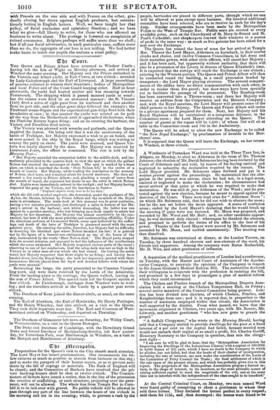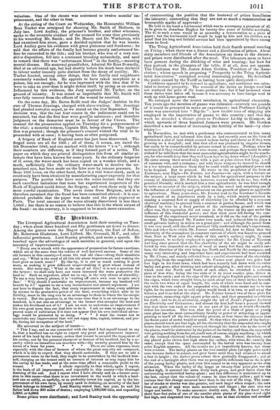'the IfIttropolis.
Preparations for the Queen's visit to the City absorb much attention. The Lord Mayor has issued proclamations. One recommends his fel- low-citizens as much as possible to abstain from business on that day ; and to make the parapets of their houses secure, so as to prevent acci- dents by the fall of copings or materials. The Bank of England will be closed ; and the Committee of Bankers have resolved that the pri- vate banking-houses shall be shut at twelve o'clock. The Commis- sioners of Sewers have issued a notice, that in the line of the procession the erection of scaffolding, or such structure, projecting over the pave- ment, will not be allowed. The whole line from Temple Bar to Corn- hill is to be laid over with gravel. No public vehicle will be allowed to pass through any part of the line between the hours of ten o'clock in the morning and six in the evening; while, to prevent a rush by the _people, barricades are placed in different parts, through which nceone will be allowed to pass except upon business. Six hundred additional constables have been selected, who are to receive Sc. each for the day's duty. Similar arrangements have been made by the Metropolitan Police to the West of Temple Bar.- P,tiblie seats are erected at every available point, such as the Church'yard of St. Mary-le-Strand and St. Paul's Cathedral ; and shopkeepers convert their windows to a source of profit in the same way : as much as five guineas has been asked for a seat near the Exchange. The Queen has named the hour of noon for her arrival at Temple Bar. Thence the Lord Mayor, Aldermen on horseback, in their scarlet cloaks and chains, and twelve Common Councilmen, in fall dress and their mazariue gowns, with other civic officers, will escort her Majesty ; and it has been said, but apparently without authority, that there will also be a procession of the Livery in dresses of Queen Elizabeth's time. It is expected that the cortege will reach the Exchange at one o'clock ; entering by the Western portico. The Queen and Prince Albert will then be conducted round the building, in a small procession headed by trumpeters ; the Lord Mayor playing cicerone. The several compart- ments of the edifice have no direct communication with each other, in order to render them fire-proof ; but door-ways have been specially cut to facilitate the passage of the procession. The Reading-room has been converted into a Throne-room ; and there her Majesty will receive an address from the Corporation and the Mercers Company ; and, with the Royal sanction, the Lord Mayor will present some of the chief persons to her Majesty. The Queen and Prince Albert will retire to a private apartment prepared for them. Next, her Majesty and his Royal Highness will be entertained at a sumptuous dejenner, in the Committee-room ; the Lord Mayor attending on the Queen. The number of guests at the repast will be 1,400; of whom 700 will sit at table in the Committee-room and 700 in the Ambulatory.
The Queen will be asked to allow the new Exchange to be called "the New Royal Exchange," by proclamation of heralds in the Mer- chants' area.
It is supposed that the Queen will leave the Exchange, on her return to Windsor, at three o'clock.
A Wardmote of Portsoken Ward was held at the Three Tuns Inn, in Aldgate, on Monday, to elect an Alderman in the room of Mr. Thomas Johnson ; the election of Mr. David Salomons having been declared by the Court of Aldermen null and void, by reason of his having omitted and neglected to subscribe the declaration required by the statute. The Lord Mayor presided. Mr. Salomons came forward and put in a written protest against the proceedings. He maintained that the alle- gation in the precept was untrue, since be had not, in a legal sense, omitted or neglected to make the declaration ; for circumstances had never arrived at that point at which he was required to make that declaration. He was still de jure Alderman of the Ward ; and he pro- tested against the new election, because he meant to appeal against the decision of the Court. There were loud cries for" Alderman Moon ": on which Mr. Salomons said, that he did not wish to obscure the moon; but let the sun set before the moon appeared. A scene of confusion arose ; ended by the Lord Mayor's declaring that he would break up the meeting if quiet were not restored. Mr. Moon was proposed, and seconded by Mr. Wood and Mr. Bull ; and, no other candidate appear- ing, he was declared duly elected : whereupon he thanked the electors, and promised to perform the duties of his office to the best of his power. Thanks to the Lord Mayor were moved by Mr. Salomons and seconded by Mr. Moon, and carried unanimously. The meeting was then dissolved.
Mr. Salomons was entertained at dinner, at the London Tavern, on Tuesday, by three hundred electors and non-electors of the ward, his friends and supporters. Among the company were Baron Rothschild, Mr. D. Wire, and other gentlemen of influence.
A deputation of the medical practitioners of London had a conference, on Tuesday, with the Master and Court of Assistants of the Apothe- caries Company, to ascertain the opinions of the Company in respect to Sir James Graham's Medical Reform Bill. The authorities declared their willingness to cooperate with the profession in resistiug the bill, and promised in a few days to promulgate a plan of medical reform which they could recommend.
The Chelsea and Pimlico branch of the Metropolitan Drapers Asso- ciation held a meeting at the Chelsea Temperance Hall, on Friday ; several active members of the Central Committee being present. Lon- don has been divided into districts, of which Chelsea, Pimlico, and Knightsbridge form one ; and it is reported that, in proportion to the number of assistants employed within that circuit, the Association is well supported by the district. From what passed, we learn that the movement originated in Chelsea, two years ago, with Mr. Rennie, Mr, Lilworth, and another gentleman " who has now gone to preach the gospel." "A Suffolk Clergyman," who wrote to the Morning Herald, having said that a Company started to provide dwellings for the poor at a fixed interest of 4 per cent on the capital had failed, because monied men would not embark their capital at so small a profit, Mr. Charles Gatliff, Honorary Secretary to the Company in question, thus sets the clergy- man right- " I am sure he will be glad to hear, that the 'Metropolitan Association for Improving the Dwellings of the Industrious Classes,' with a capital of 100,000/. in 4,000 shares of 251. each, which I have no doubt is the Company to which he alludes, has not failed, but that the heads of their charter of incorporation, including the rate of interest, are now under the consideration of the Lords of the Committee of Privy Council for Trade ; the final settlement of which is the sole cause of the present silence, and which has probably given rise to this report. The projectors of the Metropolitan Association propose a limited re- turn, in the shape of interest, to its members, as the most advisable means of raising sufficient capital to meet the magnitude of the evil, and at the same time not to interfere with the independence of the class sought to be benefited:, At the Central Criminal Court, on Monday, two men named Ward were found guilty of conspiring to cheat a gentleman to whom they sold three horses. They declared the horses perfect in every respect, sold them for 1,151., and _then decamped: the horses were found to be
valueless. One of the cheats was sentenced to twelve months' im- prisonment, and the other to four.
At the sitting of the Court on Wednesday, the Honourable William Ross Tuchet was arraigned for shooting Mr. Smith of Holborn, in July last. Lord Audley, the prisoner's brother, and other witnesses, spoke to the eccentric conduct of the accused for some time previously to his wounding Mr. Smith ; and Dr. Monro and Dr. Warburton, who bad examined him since, gave a decided opinion that he was insane. Lord Audley gave his evidence with great plainness and frankness : he said that the affairs of the family had become greatly embarrassed be- fore he succeeded to the title ; and his brother, who was of a very sen- sitive disposition, fell into a continued brooding melancholy, and used to remark that there was "unfortunate blood" in the family,—meaning mental disease. His maternal grandfather, Admiral Sir Ross Donnelly, died at an advanced age, but had shortly before his death been declared to labour under insanity quite distinct from the decay of senility. Mr. Tuchet fancied, among other things, that his family and neighbours constantly watched him. He appears to have taken morphine as a poison, but not enough ; for he was impressed with the idea that if he were to take an over-dose it might defeat itself, by acting as an emetic. Influenced by this evidence, the Jury acquitted Mr. Tuchet, on the ground of insanity. It was stated as improbable that Mr. Smith will ever fully recover from the effects of the wound he received.
On the same day, Mr. Baron Rolfe read the Judges' decision in the ease of Thomas Jennings, charged with slave-trading. Mr. Jennings had pleaded autrefbis acquit, as we stated on the 21st September. The decision was, that the last four counts in the indictment could not be sustained, but that the first foar were good:in substance ; and therefore judgment on the demurrer must be in favour of the Crown. The counsel for the prosecution applied on Thursday for a postponement of the trial; a material witness, Captain Hill, being absent. The applica- tion was granted ; though the prisoner's counsel wished the trial to be proceeded with at once ; it having been so often postponed.
A forgery of Bank of England notes has just been discovered. The forged notes are all for 100/. ; all of them, it seems, are dated the 5th December 1843, and one marked with the letters "Y-E"; although their numbers are different, as if they formed part of a series. The paper on which they are printed distinguishes this from all similar at- tempts that have been known for some years. In the ordinary forgeries of 5/. notes, the water-mark has been copied on a wooden block, and a mark, sufficiently like the ordinary water-mark to deceive the un- practised eye, has been made on the false note by intense pressure. In these 100/. notes, on the other hand, there is a real water-mark, such as could only have been obtained by manufacturing paper expressly for that purpose. The parties who have seen the notes declare that they are such excellent imitations that none but experienced inspectors of the Bank of England could detect the forgery, and even those only by the most careful examination. The notes come from Belgium, and it is therefore surmised that the fraud has been committed abroad : it is con- sidered probable that the paper was made and the plate engraved at Paris. The total amount of the notes already discovered is less than 1,0001.; but there is no reason to believe that this is the whole extent of the fraud : on the contrary, it is supposed to be much more extensive.



























 Previous page
Previous page